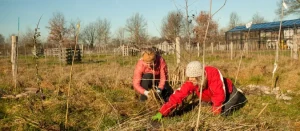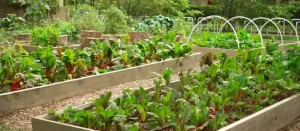SEARCH RESULTS > ARTICLES > Approach
In the face of escalating climate change and environmental degradation, the urgency to adopt sustainable practices has never been more critical. Permaculture, a design system rooted in principles of sustainability, offers a promising pathway towards mitigating the adverse effects of climate change (people and companies destroying nature) and restoring ecological balance. Learn More
Delving into the psychological aspects of permaculture, this article explores how gardening and working with the land can have profound positive effects on mental health and well-being. It discusses the therapeutic benefits of spending time in nature, cultivating mindfulness, and fostering a deeper connection to the environment through permaculture practices. Learn More
Learn why building guilds around your trees benefits your garden by fostering ecosystem health, promoting biodiversity, and enhancing soil fertility. Learn More
The no-dig method, also known as no-till gardening, is a sustainable and organic approach to cultivating vegetables without disturbing the soil structure. This gardening technique has gained popularity among gardeners due to its numerous benefits for soil health, plant growth, and overall garden productivity. Unlike traditional gardening methods that involve tilling, digging, and turning the soil, the no-dig method emphasizes minimal soil disturbance. Instead of breaking up the soil, gardeners layer organic materials on top of the ground to create nutrient-rich soil beds where plants can thrive. By implementing the no-dig method, gardeners can improve soil structure, enhance soil fertility, and promote beneficial soil organisms such as earthworms and microorganisms. Additionally, this approach helps to conserve water, reduce weed growth, and minimize soil erosion. Learn More
Electroculture gardening, an age-old practice gaining renewed attention, involves the application of electrical stimulation to enhance plant growth, health, and productivity. This innovative technique harnesses the power of electrical fields to optimize soil conditions and promote vibrant, resilient plants. Learn More
Gardening enthusiasts are increasingly turning to sustainable and environmentally-friendly practices, and one such method gaining popularity is no-till gardening. No-till gardening is a technique that eliminates or minimizes soil disturbance, promoting healthier soil and more robust plant growth. In this comprehensive guide, we will explore the principles and techniques of creating a successful no-till garden. Learn More
Gardening is not just about growing beautiful flowers or tasty vegetables; it's about creating a sustainable and harmonious ecosystem. Regenerative gardening practices aim to restore and enhance the health of the environment, soil, and biodiversity. In this article, we will explore various regenerative gardening techniques that empower gardeners to contribute positively to the planet. Learn More
Edible forest gardens, rooted in the principles of permaculture, offer a sustainable and regenerative approach to gardening that mimics the structure and function of natural ecosystems. These gardens are designed to be not only beautiful but also productive, providing a diverse range of edible plants while enhancing ecological balance. In this article, we explore the concept of edible forest gardens and delve into the permaculture practices that make them flourish. Learn More







